It's a quiet time for auctions this week, but there are some fine objets d'art coming to auction over the next few weeks and in particular Heritage Auctions' Gentleman Collector Estate sale opens for bidding today and concludes 19 January, with many items of immense fascination for the technophile.
Autographed memorabilia of Sir Edmund Hillary
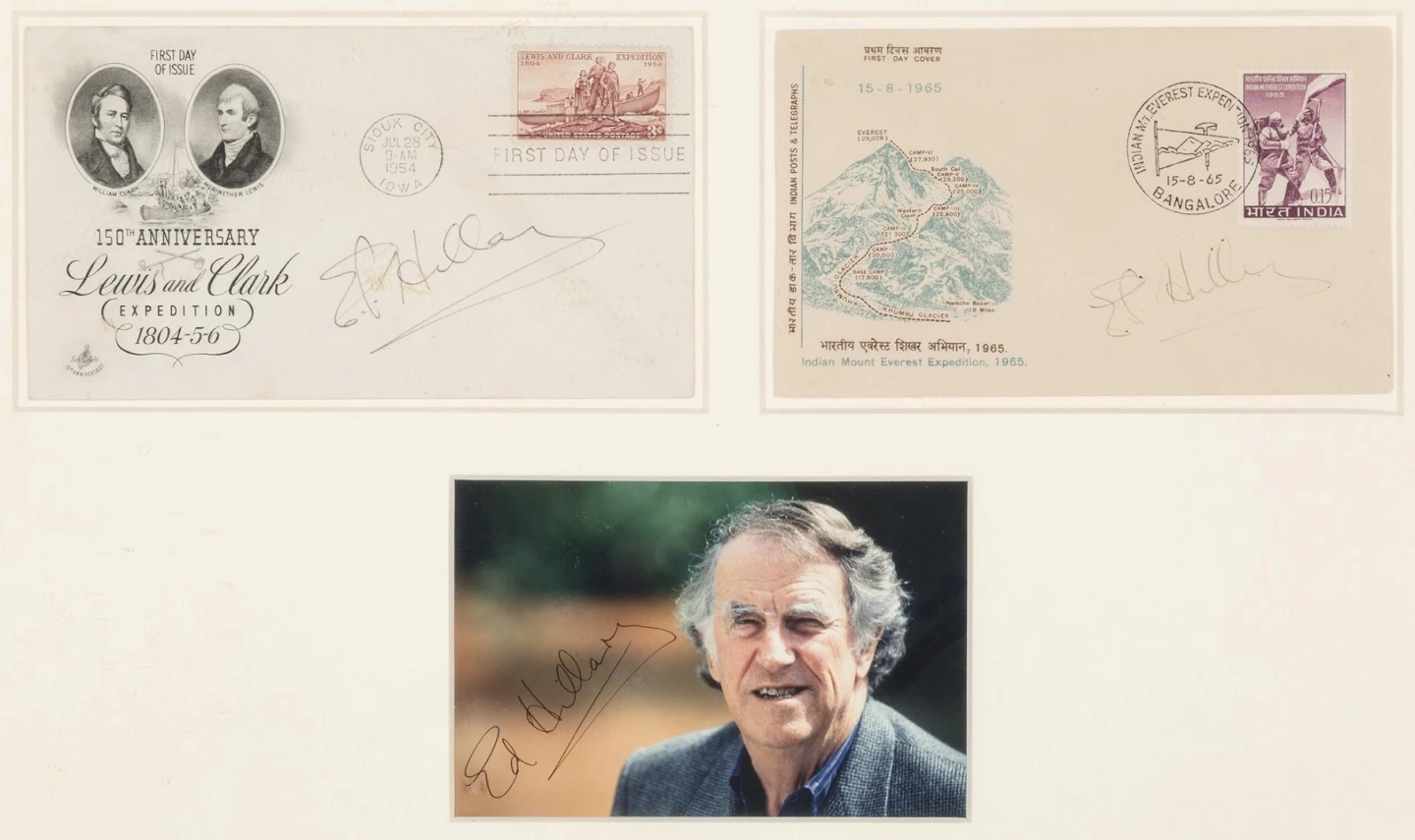
For those who set their goals high, this collection of Sir Edmund Hillary (1919-2008) memorabilia will make an ideal daily reminder of what is possible. It comprises two first-day-issue Postal Covers and a photograph, all autographed by the first man to climb the world's tallest mountain. With an estimate of US$400 to $600, I'm sure many of our readers could envisage this framed momento of achievement on their office wall.
Signed autograph Albert Einstein letter
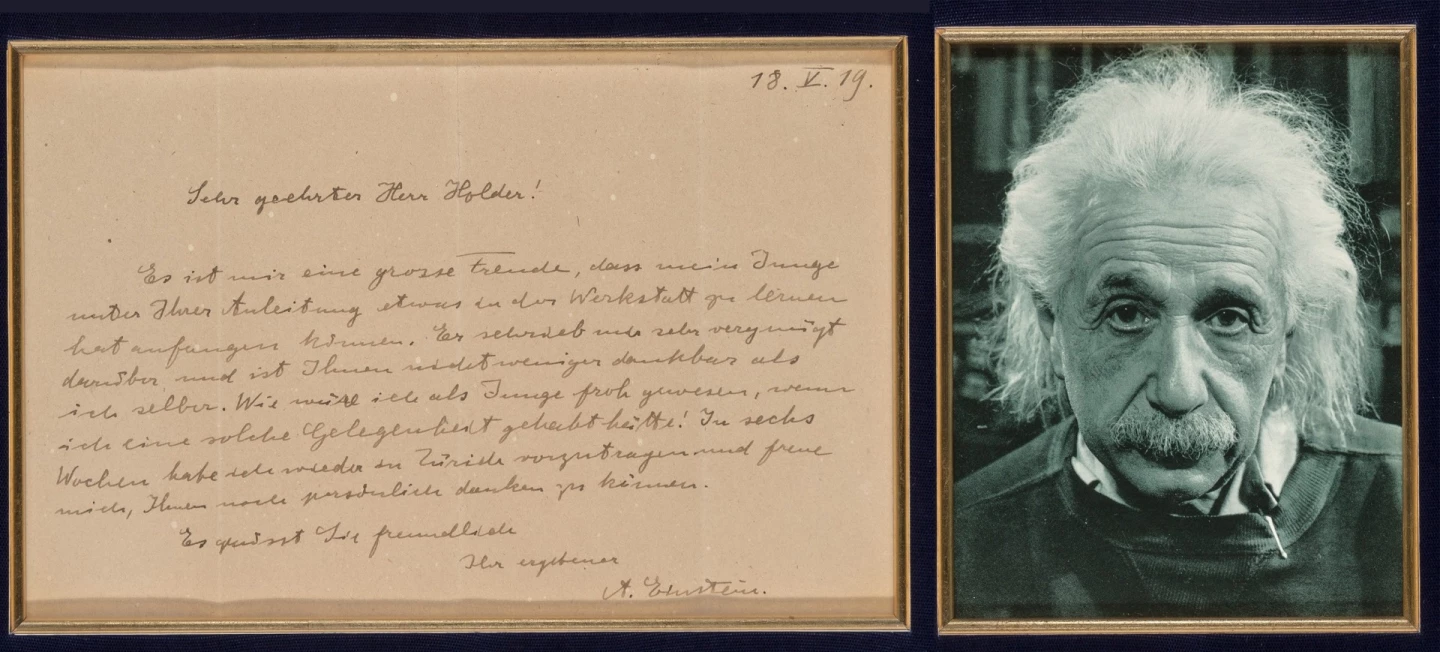
Einstein memorabilia appreciates in value more than any other scientific artifacts and this item will be particularly significant for those who have children. It's a letter written (in German) by the epitome of genius to a man who had just given Einstein's son his first job.
It reads (transcribed): Dear Mr. Holder:It is a great pleasure for me that my son was able tobegin his apprenticeship in the shop under your supervision.He was very happy when he wrote me about it and I myself amas thankful as he is. How happy I would have been as a boy,if I had had such an amazing opportunity! In six weeks I have tolecture again in Zurich and I am looking forward tothanking you again in person.With best regardssincerely yoursA Einstein.
My guess is that it will sell for an order of magnitude (or two) more than the estimated $1,500 to $2,500, but whatever it sells for, it will be worth a lot more a decade from now as collecting is a growth industry, and Einstein's brand values are already tracking to become the most desirable in history.
Framed autographs of Sir Isaac Newton, Charles Darwin and Sir Humphrey Davy
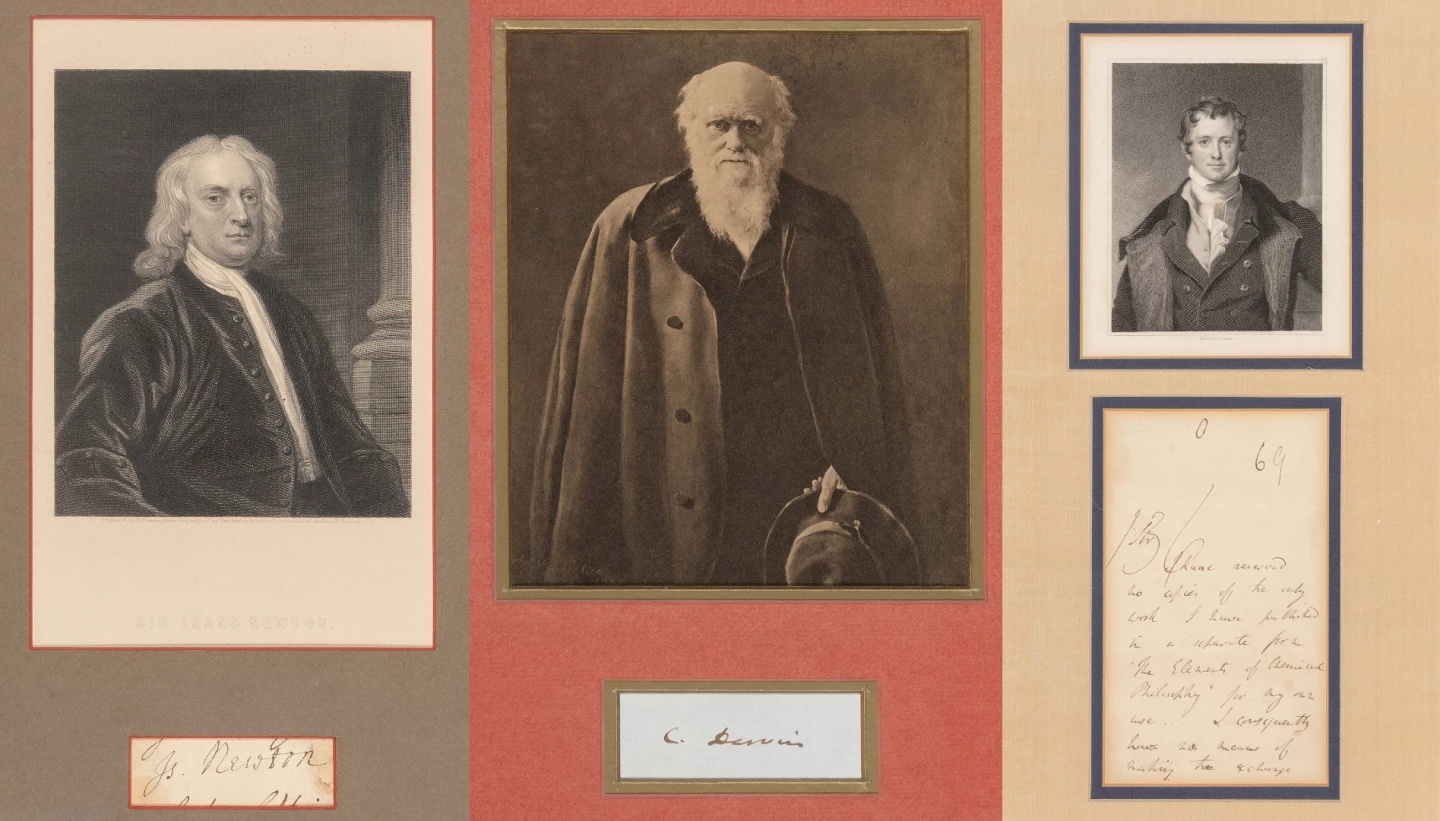
Lovers of scientific history will no doubt be interested in this grouped lot of framed autographs by three of the most famous scientists of all time: Sir Isaac Newton, Sir Humphrey Davy, and Charles Darwin.
Newton needs no introduction as the most significant scientist of all-time. Even Einstein wrote: "No one must think that Newton's great creation can be overthrown in any real sense by this [Theory of Relativity] or by any other theory. His clear and wide ideas will for ever retain their significance as the foundation on which our modern conceptions of physics have been built."
Darwin's theory of evolution was almost as significant, described by Sigmund Freud as one of the great outrages which science has forced on mankind's naive self-love, having "robbed man of his peculiar privilege of having been specially created, and relegated him to a descent from the animal world, implying an ineradicable animal nature in him."
Though Davy is less well known, he is best remembered for isolating potassium, sodium, calcium, strontium, barium, magnesium, boron, chlorine and iodine for the first time, and inventing the science of electrochemistry.
The official estimate of this lot is particularly conservative at between $4,000 and $6,000 and when the virtual hammer falls on 19 January, I expect the final price will be (much) greater.
Framed Autographs of Jonas Salk, Linus Pauling, and Albert Sabin
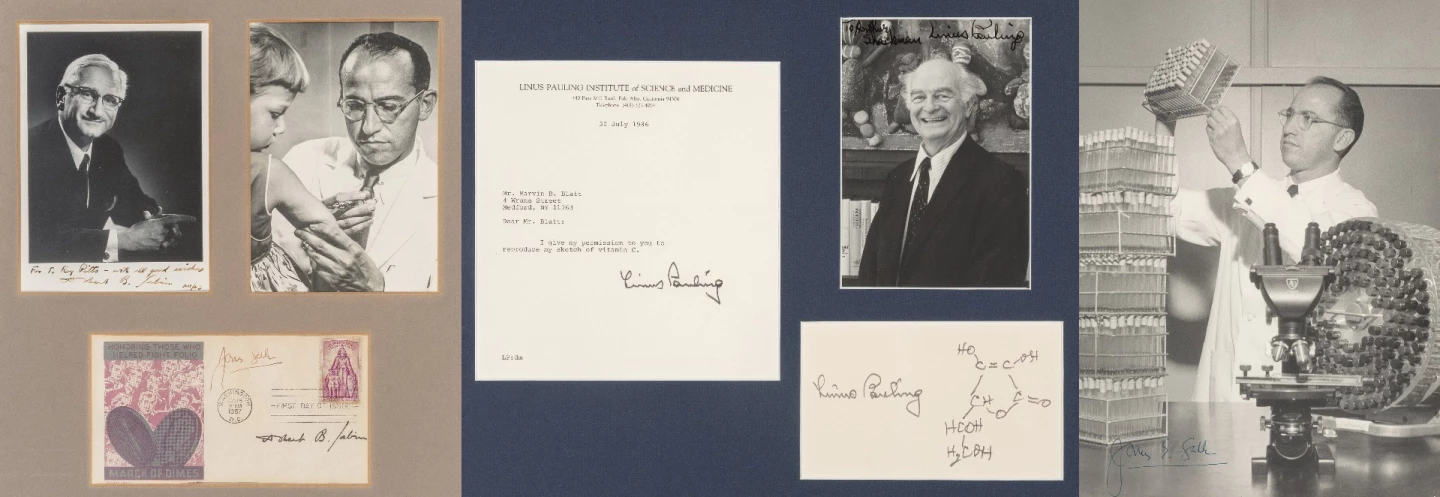
Yet another grouped lot of framed autographs heading for auction at Heritage Auctions is this trio of medical pioneers: Jonas Salk, Linus Pauling, and Albert Sabin.
Sabin (1906-1993) and Salk (1914-1995) are best known for developing polio vaccines which were responsible for eradicating one of the most frightening diseases in modern history. It might seem like ancient history now, but the 1952 US polio epidemic killed over 3,000 people (mostly children) and left more than 21,000 in various degrees of paralysis.
Pauling is even more significant, having several times been named as one of the 20 greatest scientists of all time. He published more than 850 scientific papers, won the 1954 Nobel Prize in Chemistry, then in 1962 he was awarded the Nobel Peace Prize for his activism.
Snaring these autographs within the estimated $400 to $600 would be a bargain.
Framed autographs of Thomas Edison, Alexander Graham Bell, and Guglielmo Marconi
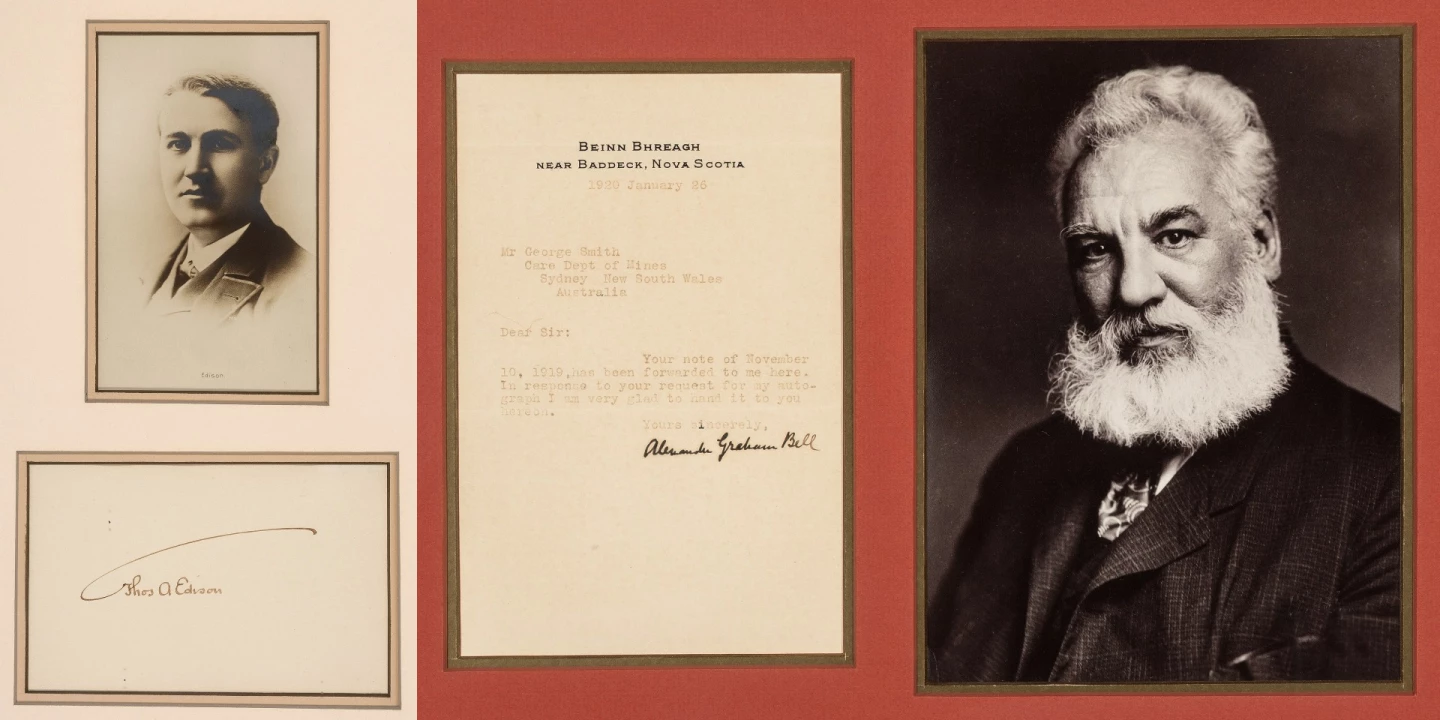
With an estimate of just $400 to $600, this group of framed autographs of three giants of modern technology would be the steal of the auction. Thomas Edison, Alexander Graham Bell, and Guglielmo Marconi all had a profound influence on the modern world with their inventions: the electric light, the telephone, radio, the phonograph, the telegraph, motion pictures ...
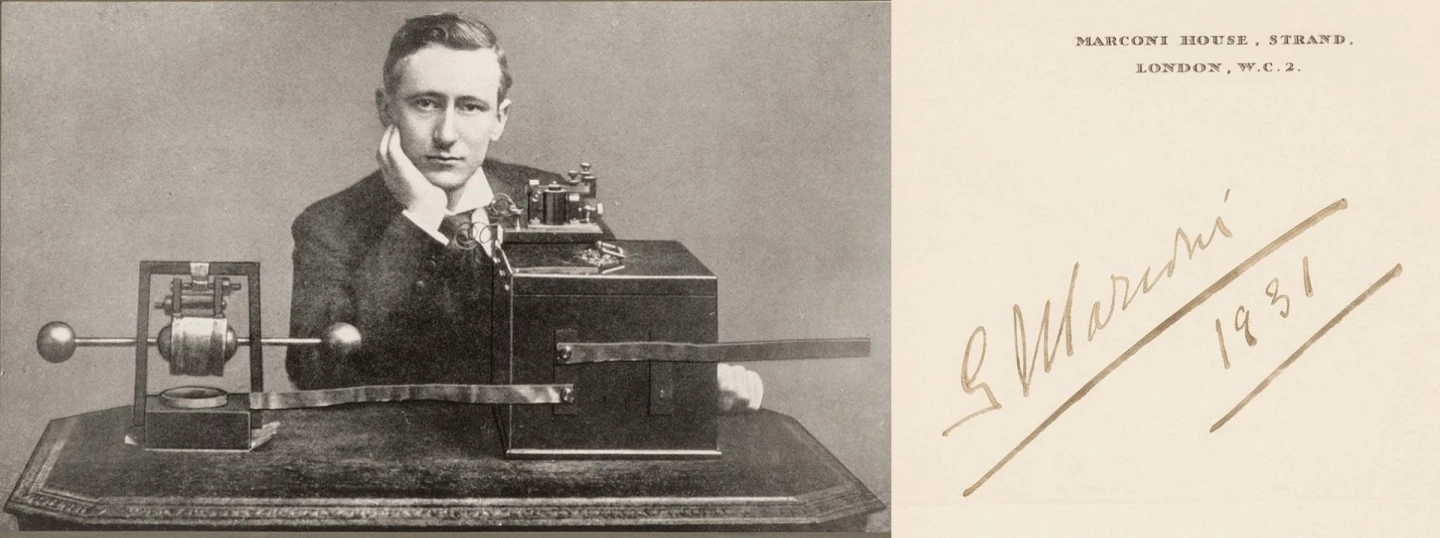
... and you can bid and watch the auction live here.
Map of the British Empire in North America circa 1781
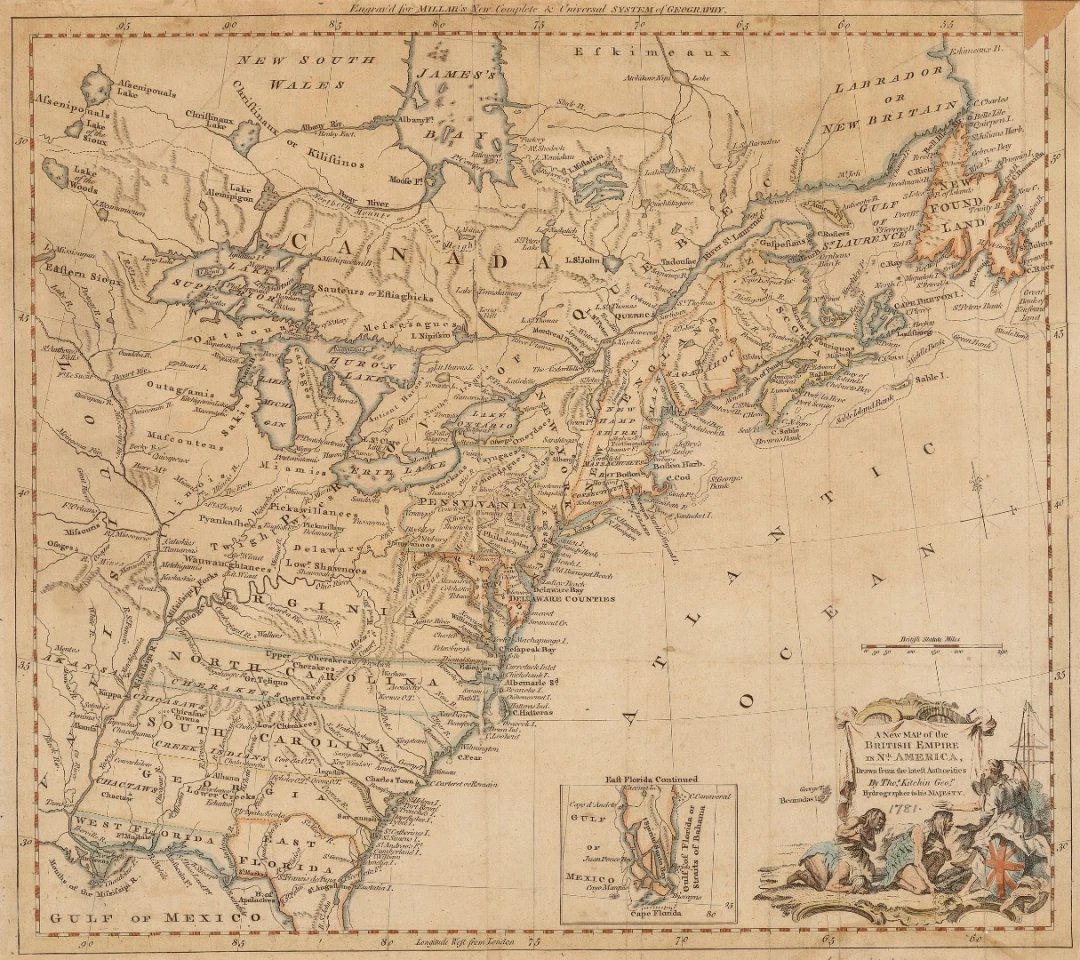
This Revolutionary War map of the British Colonies in North America is estimated to sell for between $2,000 and $3,000. The map was originally drawn in 1776 (though this printing was later) and covers the region east of the Mississippi and from James Bay to the Gulf of Mexico with the inset showing southern Florida.
1640 Map of Virginia by Willem Blaeu: Nova Virginiae Tablua
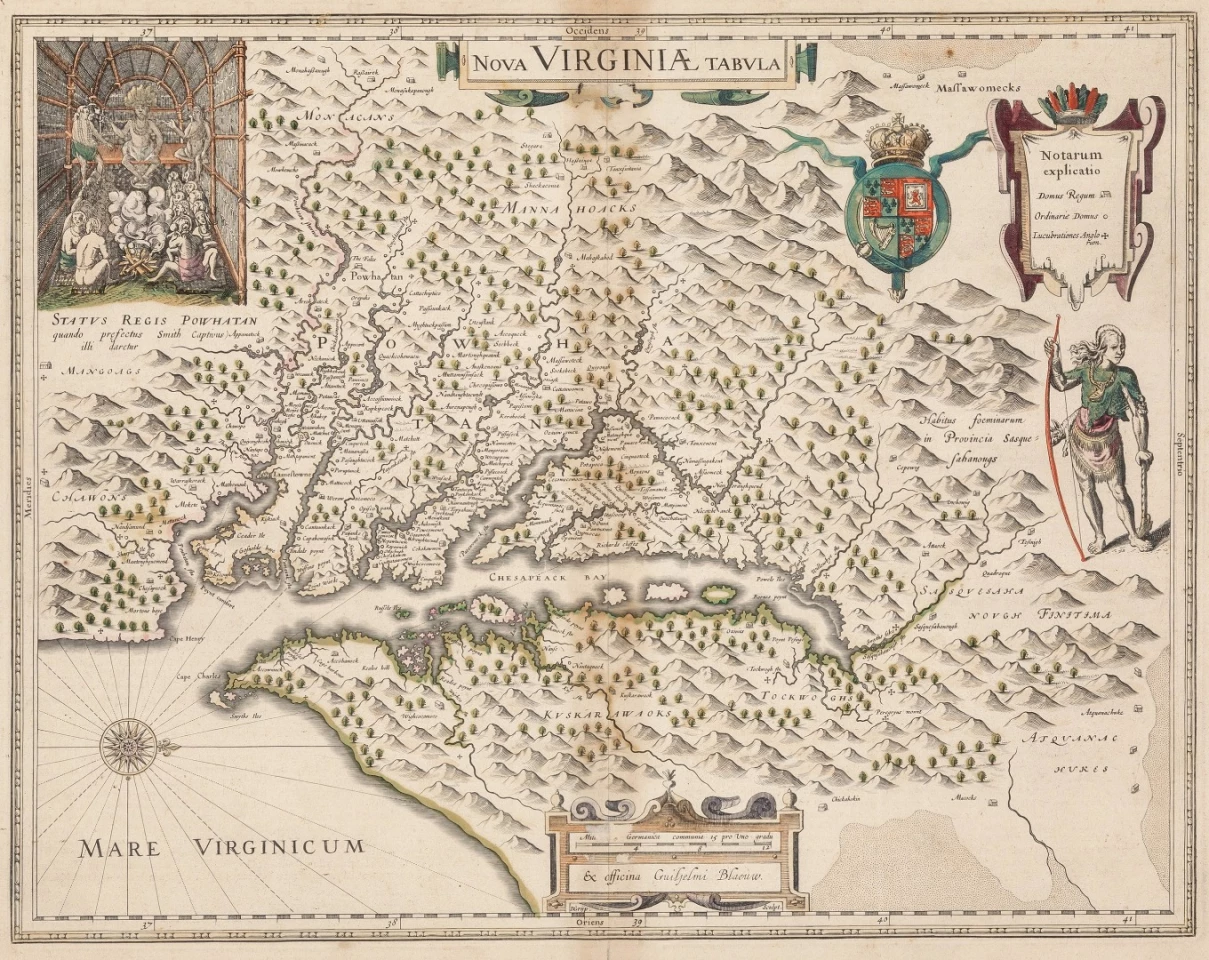
A fine example of Blaeu's map of Virginia and the Chesapeake region, which was based upon James Smith's map of Virginia, the most important map of Virginia published in the 17th Century. This 1640 map is estimated to sell for between $1,500 and $2,500.
19th century Edison-designed Stock Ticker Machine
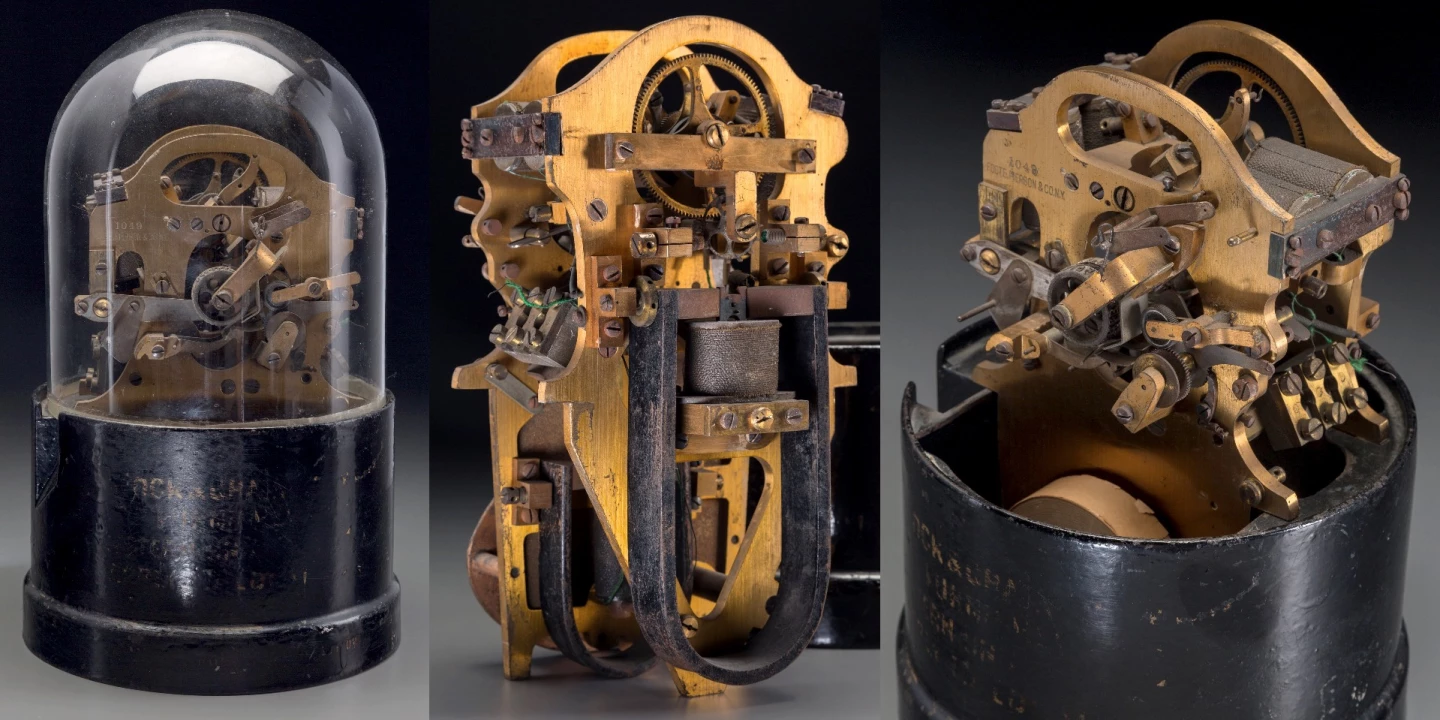
Just the toy for a stockbroker who values historical perspective (is that a redundancy?), this Thomas-Edison-designed stock ticker is estimated to sell for between $800 and $1,200.
1930 Muldivo Pin Wheel Calculator
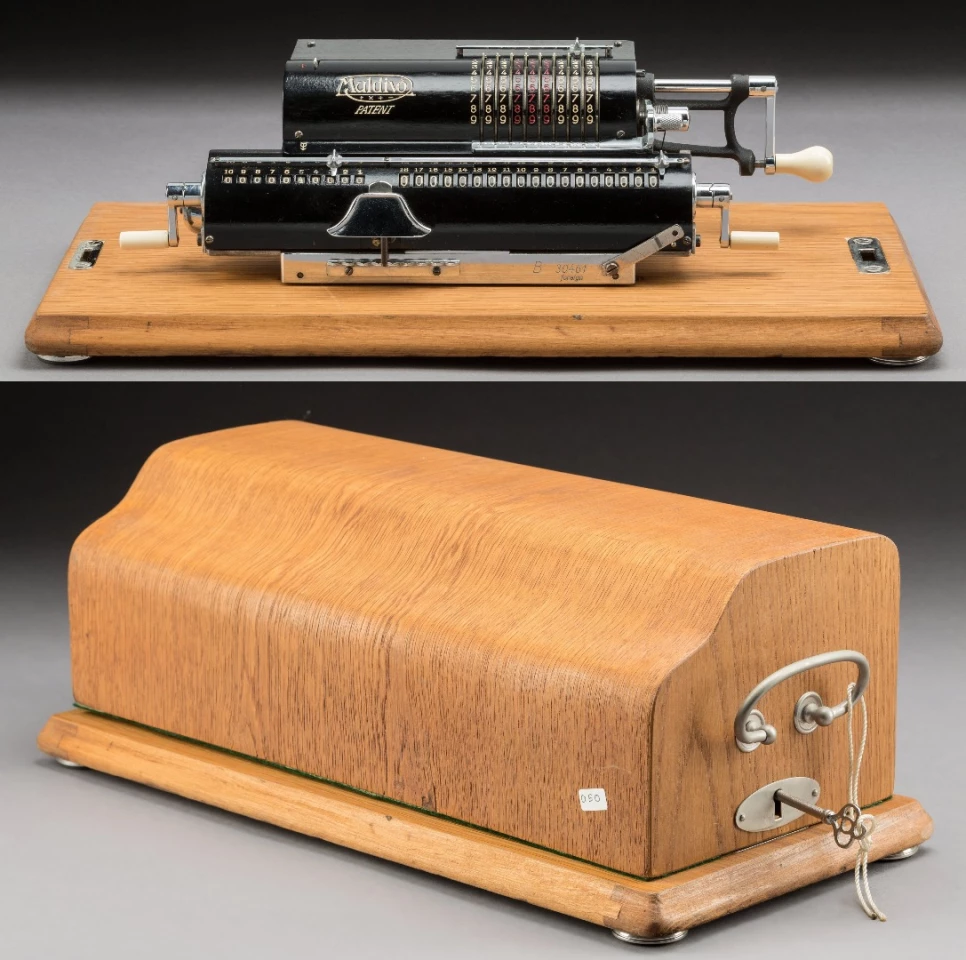
If you have trouble imagining a world without computers, imagine the difficulties of a world without calculators. The pinwheel calculator was conceived by German Polymath Gottfried Leibniz, one of history's most accomplished minds and, with Sir Isaac Newton, the co-inventor of calculus (see #24 of The most valuable scientific documents of all-time).
We owe much to Leibniz, as he also refined the binary number system, which underpins the digital revolution we are currently experiencing. Leibniz first described the pinwheel calculator in 1685 and also invented the Leibniz wheel, which was used in the arithmometer, the first viable mechanical calculator which was first manufactured in 1851.
This 1930 Muldivo Model B Brunsviga-Style Pin Wheel Calculator not only works perfectly, it is in extraordinary condition and with an estimate of $450 to $950, the perfect toy or foyer display for a person or persons with a passion for numbers.
1940 Mitchell 35mm Motion Picture Film Camera and Bach-Auricon 16mm Motion Picture Newsreel Camera
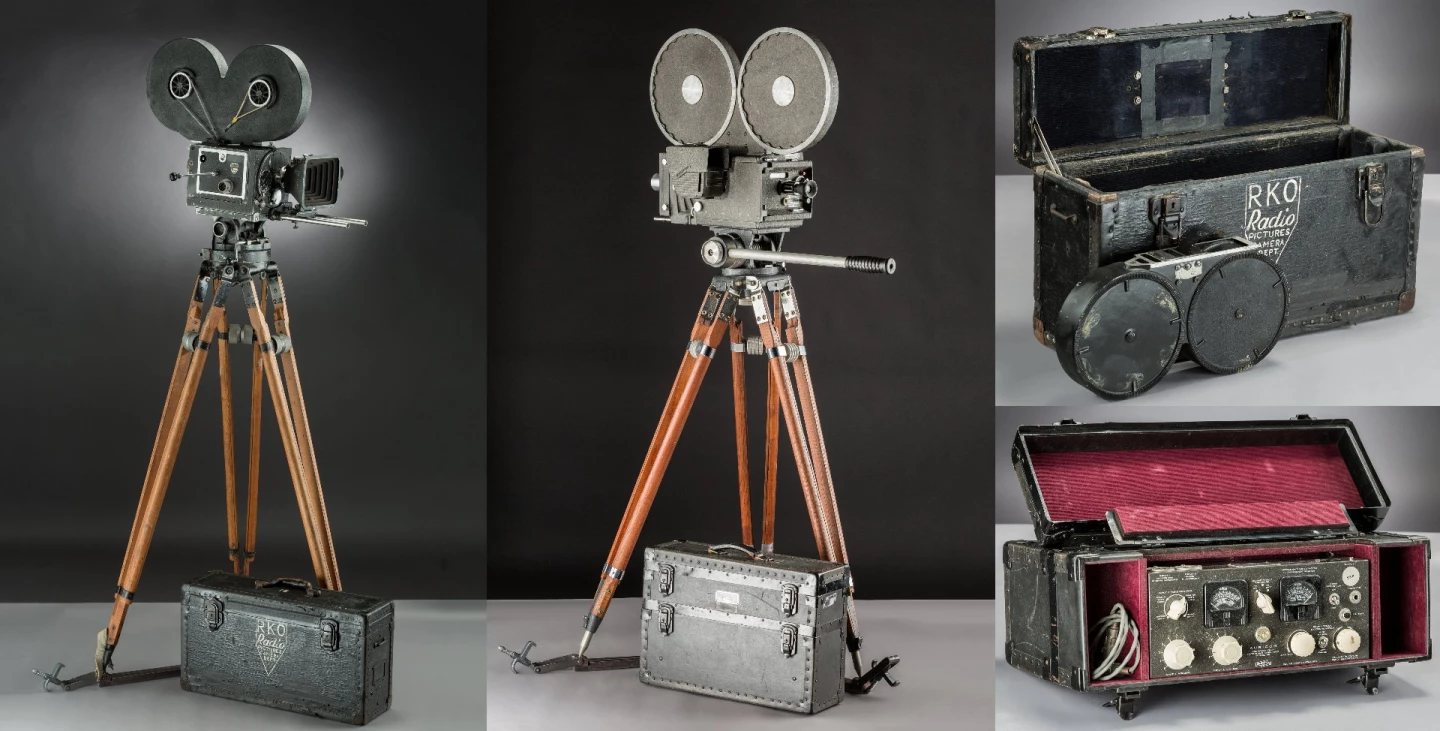
Two interesting movie cameras will sell at Heritage Auctions next month, the most significant, pictured left, being a Mitchell 35mm Standard A Motion Picture Film Camera, which was designed 1919 and in this case, manufactured circa 1940.The camera was originally owned by RKO Radio Pictures and then owned and used by a Walt Disney Cinematographer in Hollywood for shooting film for Disney. These early Mitchell Standard motion picture cameras shot nearly all of the early movies in Hollywood and around the world since their introduction in 1919. The camera is estimated to sell for between $70,000 and $100,000.
The camera pictured in the center is an original and correct Bach-Auricon 16mm Motion Picture Newsreel Camera circa 1953 with original wood tripod, lens, sound amplifier and 1,200 ft film magazine and estimated to sell for between $25,000 and $35,000.
As the auction description states, both would make a "wonderful decorative and historical sculpture for home or office."
Alexander Hamilton Family Archive of Letters and Manuscripts
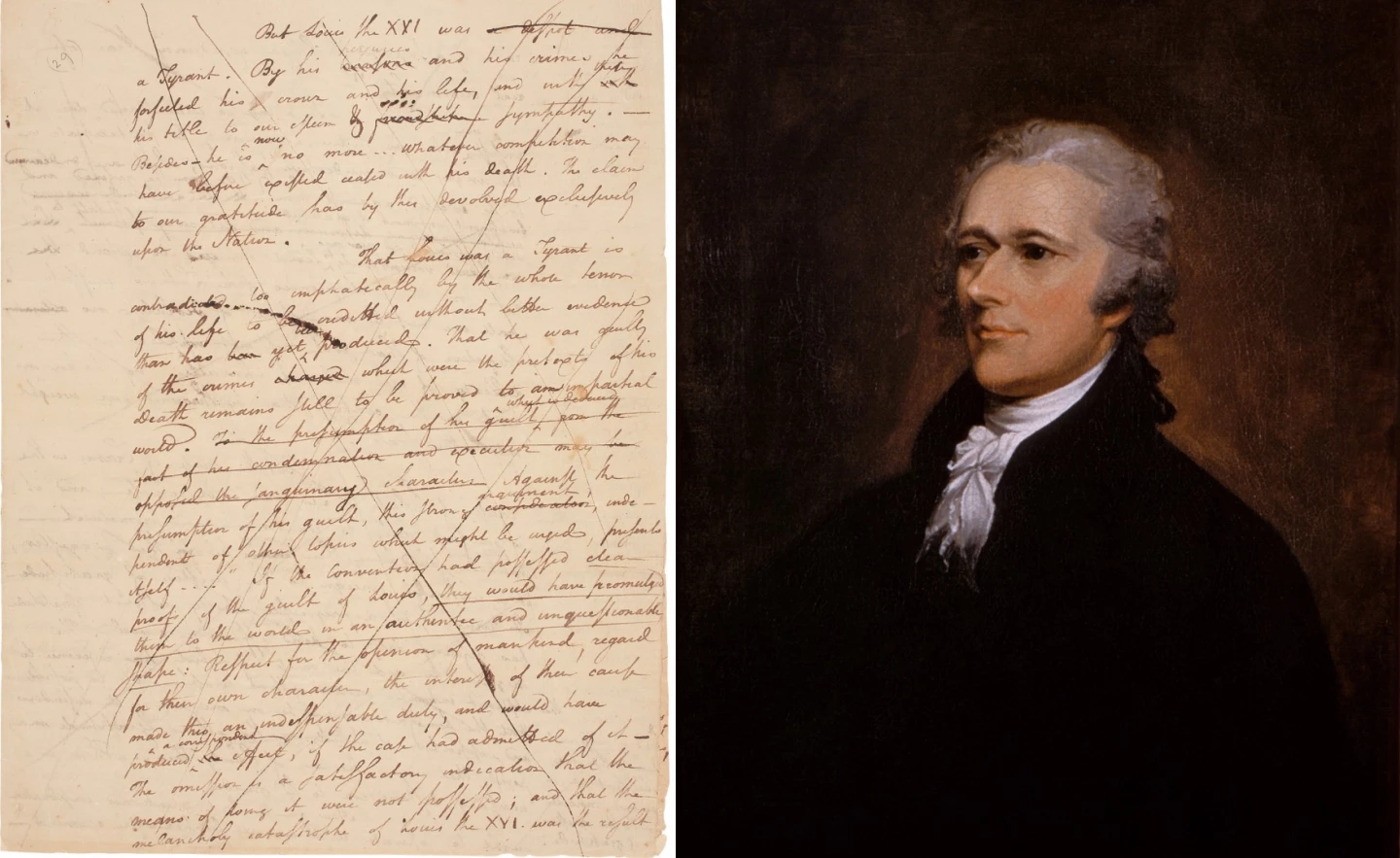
Alexander Hamilton (1755 or 1757 – 1804) was an American statesman and one of the Founding Fathers of the United States. Though his image appears on the United States $10 note, much of Hamilton's public recognition is due to the 2015 Broadway smash hit musical Hamilton.
Hamilton was the founder of the Bank of New York, the first Secretary of the Treasury (and hence the founder of the nation's financial system), the Federalist Party, the United States Coast Guard, and the New York Post newspaper. He was also a poet, artillery captain, adjutant to General Washington during the Revolutionary War, congressman, abolitionist, New York state assemblyman, member of the Constitutional Convention and the New York Ratifying Convention, and the essayist responsible for the majority of the Federalist Papers and all of the Pacificus Papers. He was also a formidable force in the country's first four presidential elections.
On 17 January, 2017, Sotheby's will offer a highly important family archive of manuscripts by and relating to Hamilton which touch on virtually every phase of his extraordinary life.
The highest estimate ($300,000 to $500,000) of the 77 lots on offer is a previously unrecorded autograph draft of Pacificus Essay NO. VIthough there are many other important and fascinating offerings in the sale.
The first printed account of Charles Darwin's discoveries on "The Beagle"
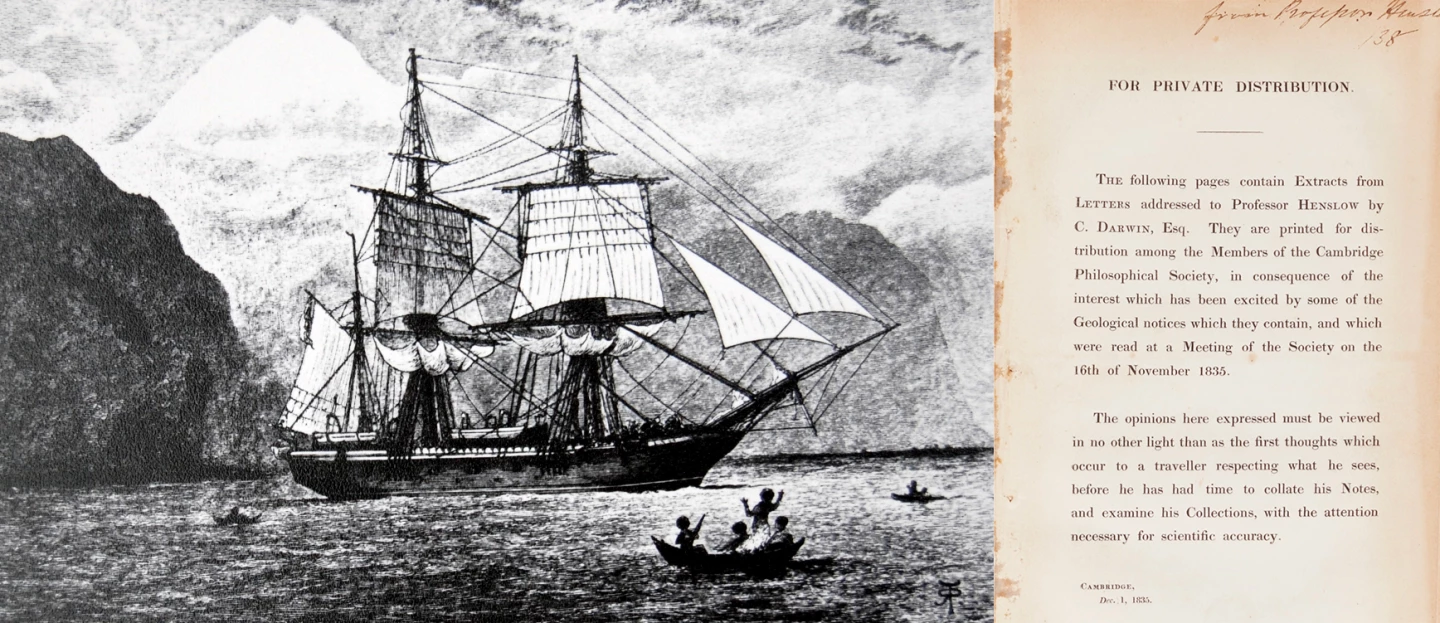
This first edition of Charles Darwin's first separately printed work, made up of extracts from letters sent by Darwin to his mentor and friend Professor John Stevens Henslow and signed by Henslow, sold for £212,500 ($269,528) at Sothebys on 13 December.
"An Account of the Proceedings, in order to the Discovery of the Longitude" included in a bound collection of pamphlets
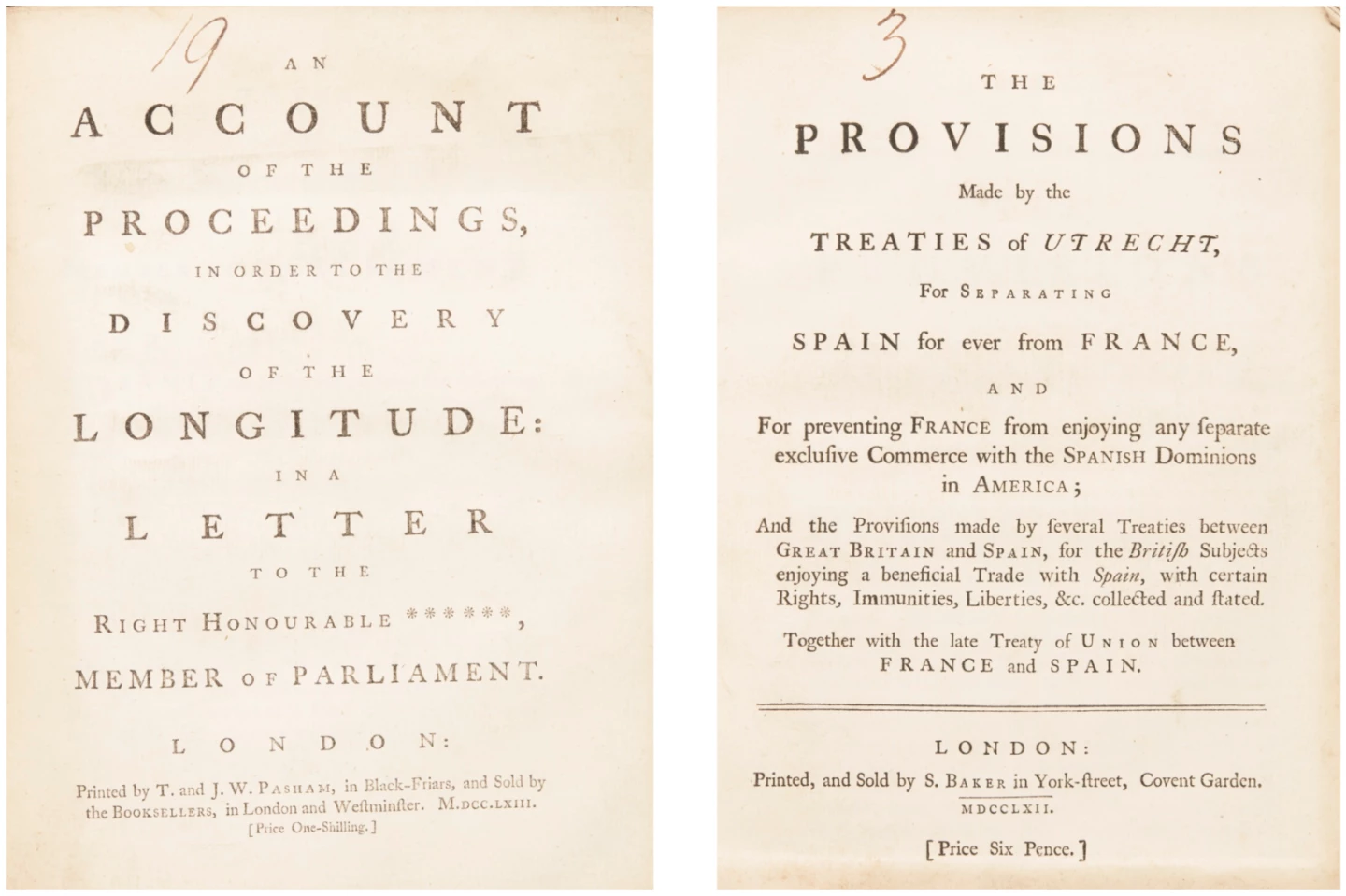
This collection of 36 pamphlets bound in one volume includes a number of historically significant pamphlets, including An Account of the Proceedings, in order to the Discovery of the Longitude and The Provisions made by the Treaties of Utrecht for separating Spain for ever from France.
The most important of the pamphlets is John Harrison's announcement of his invention and testing of the first accurate marine chronometer, which is generally acknowledged to be the most important navigation aid before the invention of radar.
Like many great breakthroughs in scientific history, the invention of Harrison's marine chronometer was catalyzed by a government offering a prize for the the solution of a problem. In this case, the British government offered a longitude prize for a method of determining longitude at sea. Announced in 1714, the awards ranged from £10,000 to £20,000 (£2 million to £4 million in today's money) depending on accuracy.
After three attempts, Harrison solved the problem with his H4 chronometer designed in 1761 and ultimately claimed the £20,000 longitude prize.
The Treaties of Utrecht were signed by the belligerents in the War of the Spanish Succession in 1713. The treaties between several European states, including Spain, Great Britain, France, Portugal, Savoy and the Dutch Republic, helped end the war.
The bound volume of pamphlets sold for £137,500 ($174,400) against an estimate of £30,000 to £50,000 at Sotheby's English Literature, History, Children's Books and Illustrations sale on 13 December, 2016.
General Scientific Manuscript in Latin - circa 1400
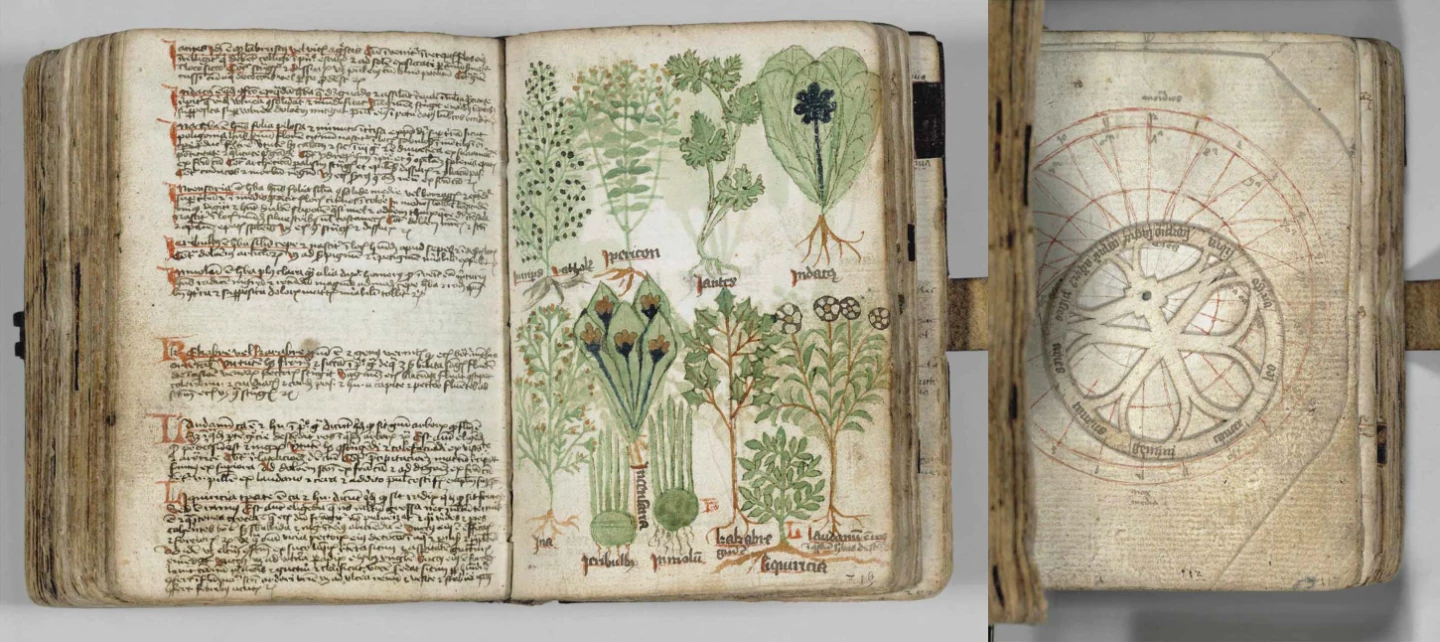
Accurately described by the catalog description as a "striking testament to medieval scientific knowledge : a rare compilation of astronomical texts, including an astrolabe model, various apparently unpublished medical treatises, and an illustrated herbal."
The manuscript sold for $295,500 against an estimate of $20,000 to $30,000 at Christie's New York auction of Fine Printed Books and Manuscripts on 14 December 2016.
Metal Ear Trumpet, circa 1820
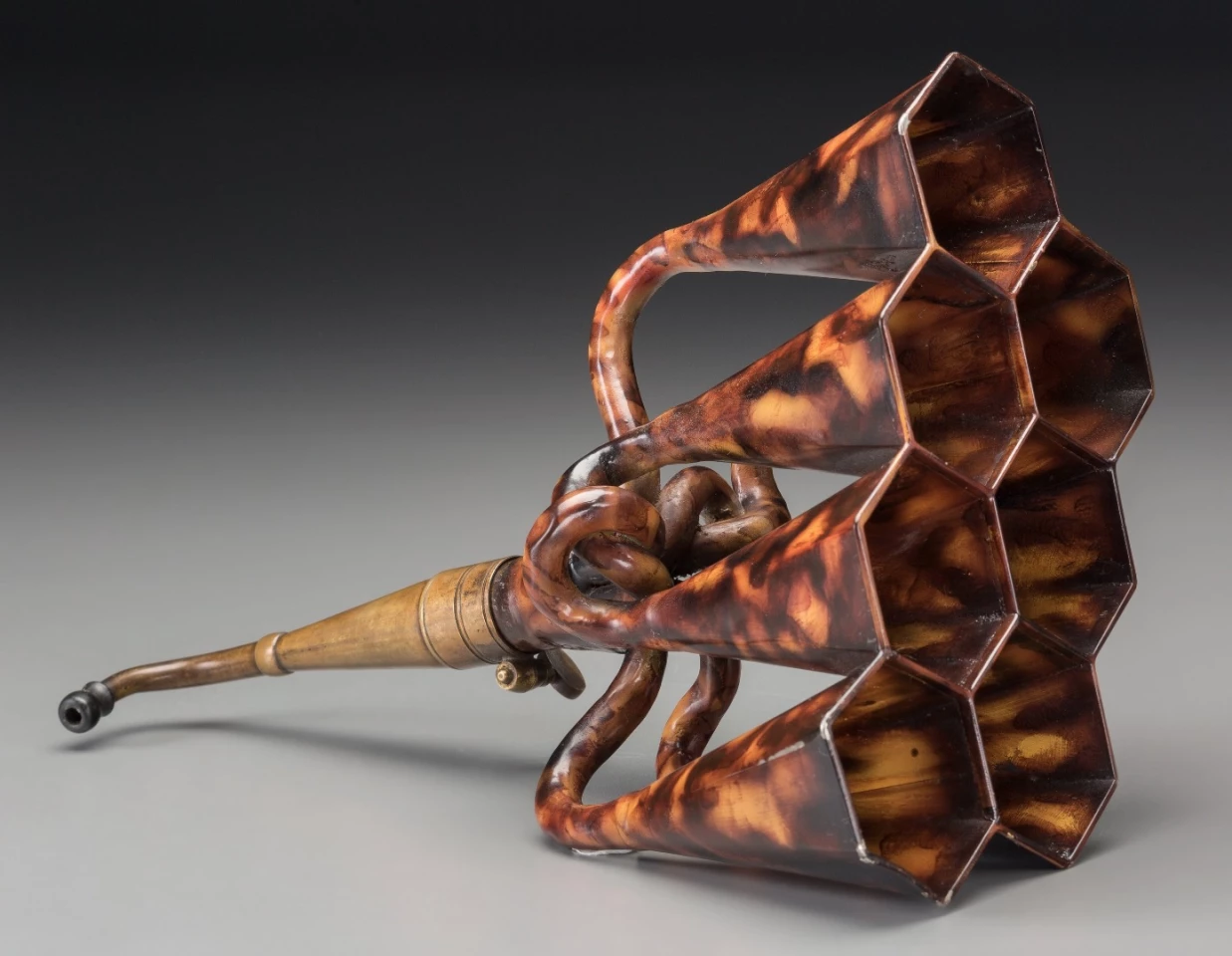
Long before electronic hearing aids and the Cochlear implant, the only hearing aid available was the ear trumpet, which funnels sound waves into the ear. Though conceived some 150 years earlier, ear trumpets were first manufactured in 1800, making this elaborate item with seven trumpet heads, one of the very earliest available.
For the hard-of-hearing, ear trumpets quickly became popular with one of the first prominent users being Ludwig Van Beethoven. With an estimate of $1,000 to $1,500, it's an affordable and fascinating triumph of ingenuity, not to mention a wonderful conversation piece.




















